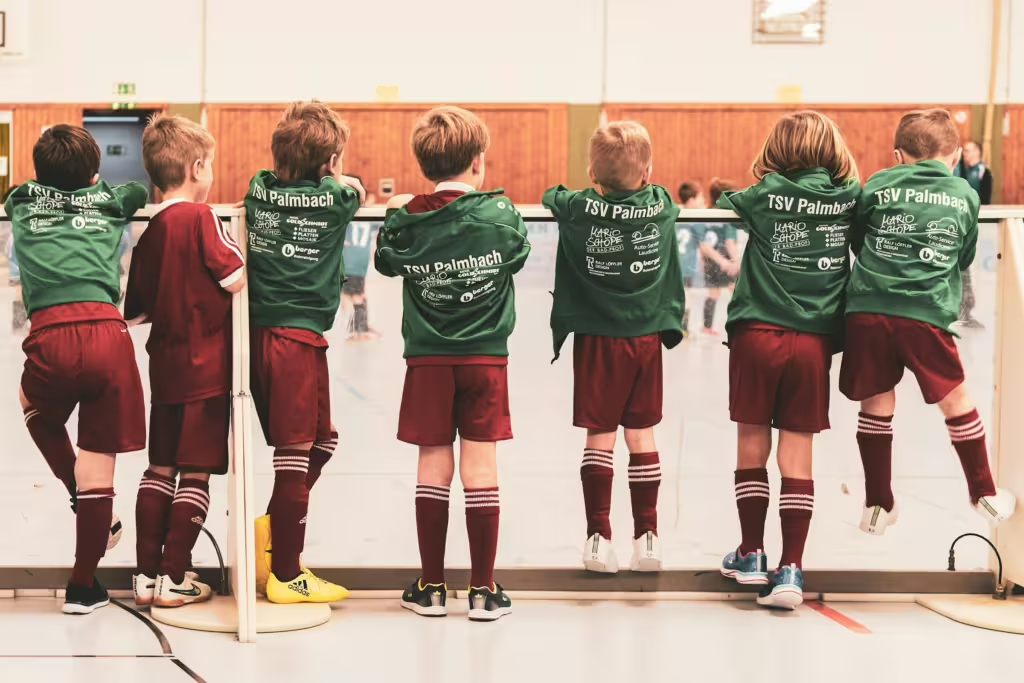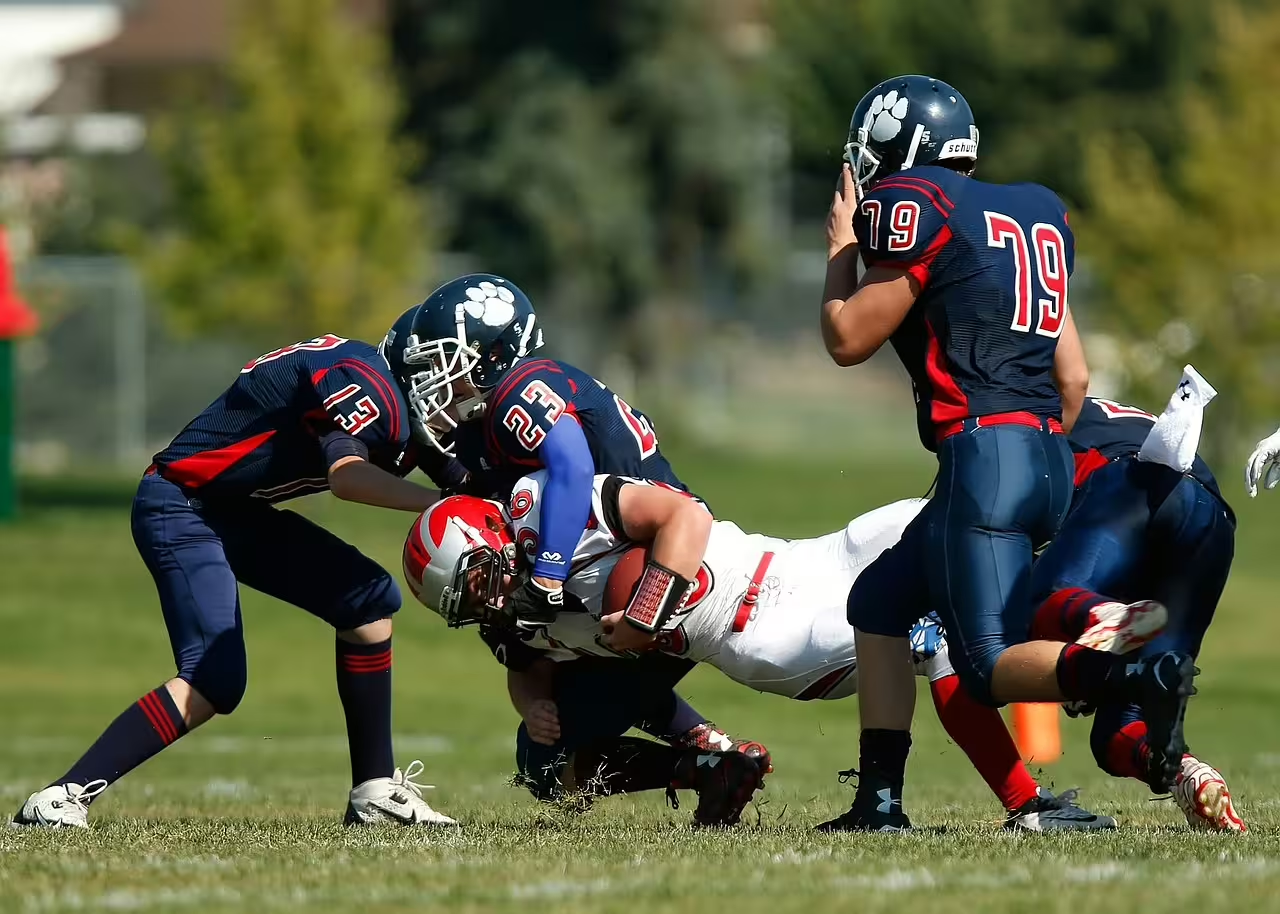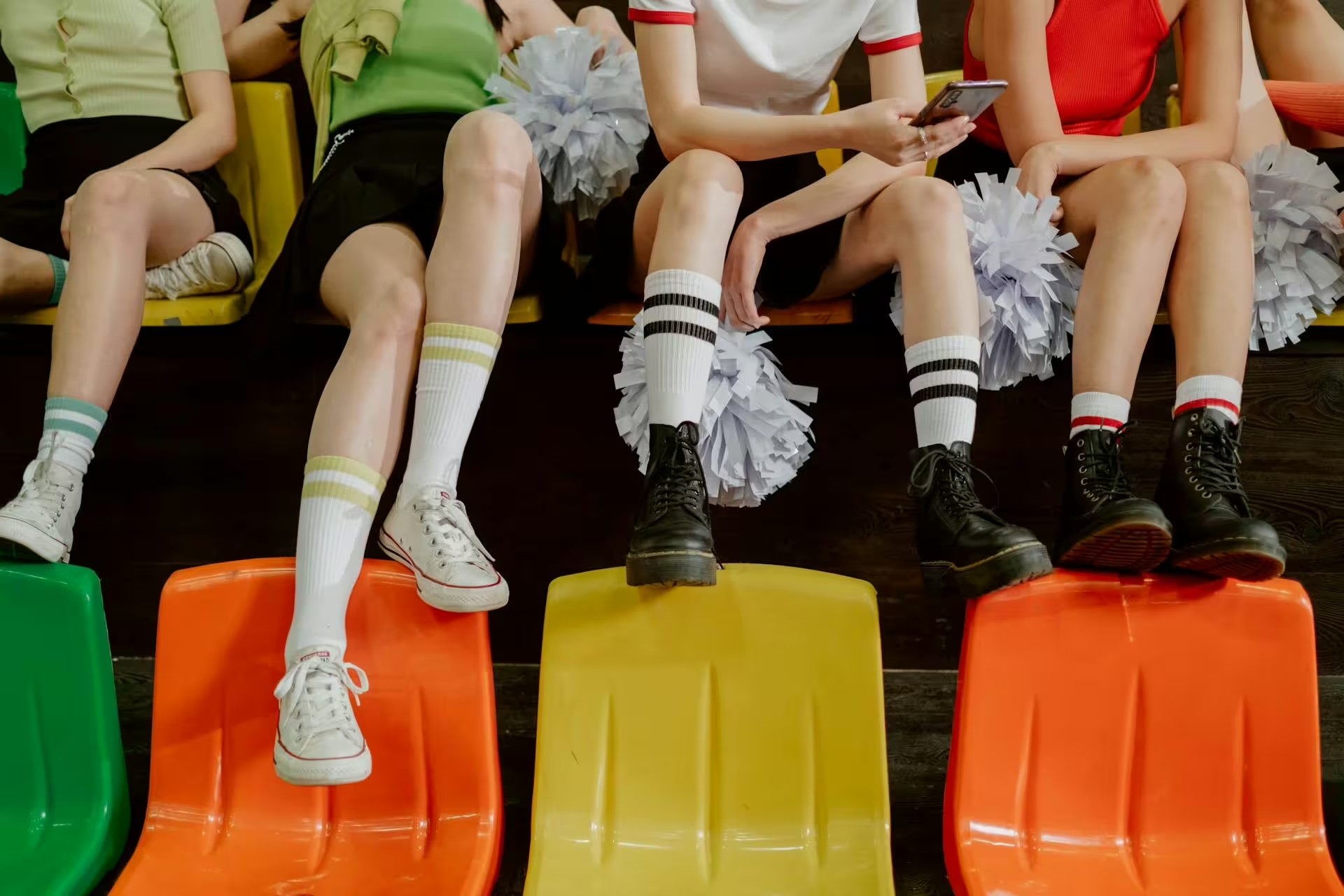Coaches and sports movies have been trying to instill the spirit of teamwork in us for untold generations. This isn’t just some hackneyed plot point either, team work is one of the most important aspects of sports in general. We’re not just talking about team sports either. Even individual sports like gymnastics can have important team dynamics that contribute to the confidence, comeraderie, and success of each individual athlete.
In sports, the focus is often on winning, scoring, and achieving personal bests. What many young athletes often forget, especially when they start sports in childhood, is the well-being of the whole team. Like dribbling, skating, or batting, teamwork is a skill that needs to be actively cultivated. It takes practice to learn how to look past our individual needs to see the bigger picture.
Indeed, the impact of team spirit cannot be underestimated. When we work together, cheer each other on, and encourage everyone to do their best, we end up building something truly amazing: a team that succeeds or fails as one. Team spirit is all about lifting each other up, and it’s one of the biggest reasons why teams accomplish great things. In this article, we will explore what team spirit is and how can it help everyone succeed. Let’s dive in to find out!
What Is Team Spirit?
Team spirit is defined as the feeling of unity and togetherness among teammates. The purpose is about working together toward the same goal. In team sports we want everyone to succeed, not simply ourselves. It doesn’t matter if it’s soccer, basketball, gymnastics, or swimming, team spirit can make a huge difference in the way that children perform and the way they feel about the sport.
A good team cheers each other on, they show team spirit by picking each other up when they have made mistakes, and they celebrate each other’s achievements. This is particularly important in young children, when confidence and sportsmanship are semi-novel concepts. When each member of a team feels supported, they feel more motivated to keep improving. Team spirit is an essential piece of what makes sports fun, exciting, and meaningful, and it’s especially necessary when things get tough.
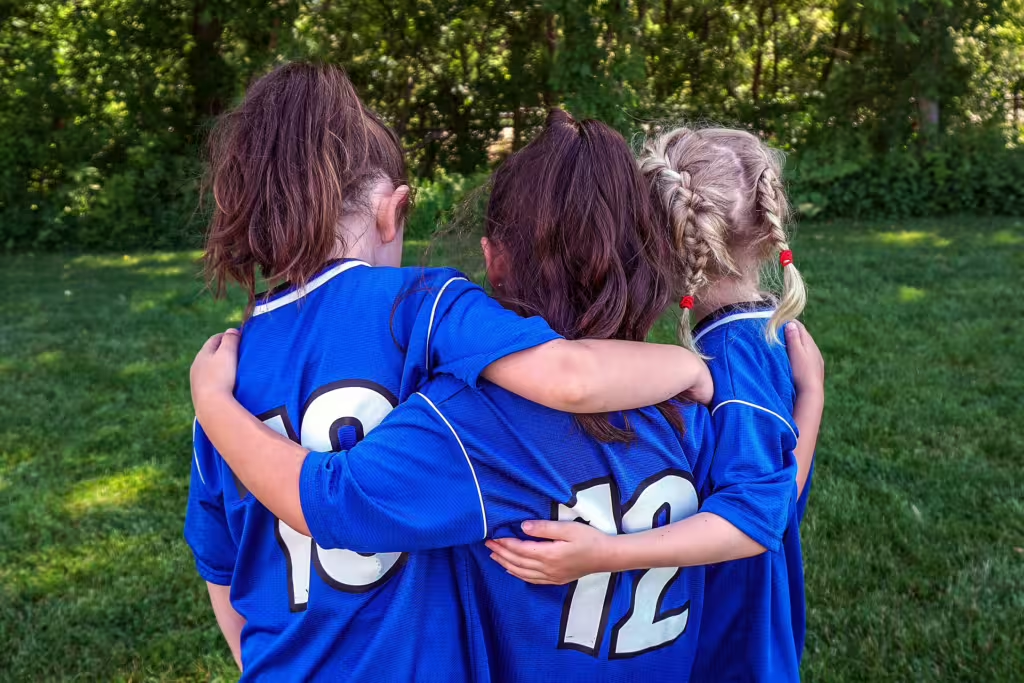
Why Team Spirit Matters in Sports
The power of team spirit goes beyond scoring points or winning games. Teammates that support one another alter the entire sports environment with their positivity. In showing support and confidence in each other, they create a space where everyone can grow, learn, and have fun together. Below, we have listed a few reasons why team spirit is so important:
Encourages a Positive Attitude: Cheering one’s teammates on can keep everyone’s spirits high, even during difficult or troubling moments. A positive attitude can make tough challenges feel more manageable and keep the team going.
Builds Confidence: When a child knows that their teammates believe in them, it boosts their confidence. Team spirit helps young athletes feel capable and motivated to take on challenges, both as individuals and by knowing they can rely on one another to succeed.
Creates Strong Friendships: Playing on a team is a great way for children to build friendships that may end up lasting well into their formative years. Teammates who support each other learn to trust one another. The bonds of trust and friendship they cultivate on the playing field can last well after the season ends.
Teaches Leadership and Responsibility: Team spirit encourages each member of the team to look out for their fellow athletes, which helps develop leadership skills from a very young age. Being supportive of their teammates also teaches children responsibility. In this way, each player learns that their actions affect the whole team.
Increases Motivation and Effort: When everyone is working together, young players feel more motivated to put in extra effort. It also helps children to know that their teammates are counting on them. This is what helps kids to push through tough practices and games, even when their own natural impulses might make them want to simply give in.
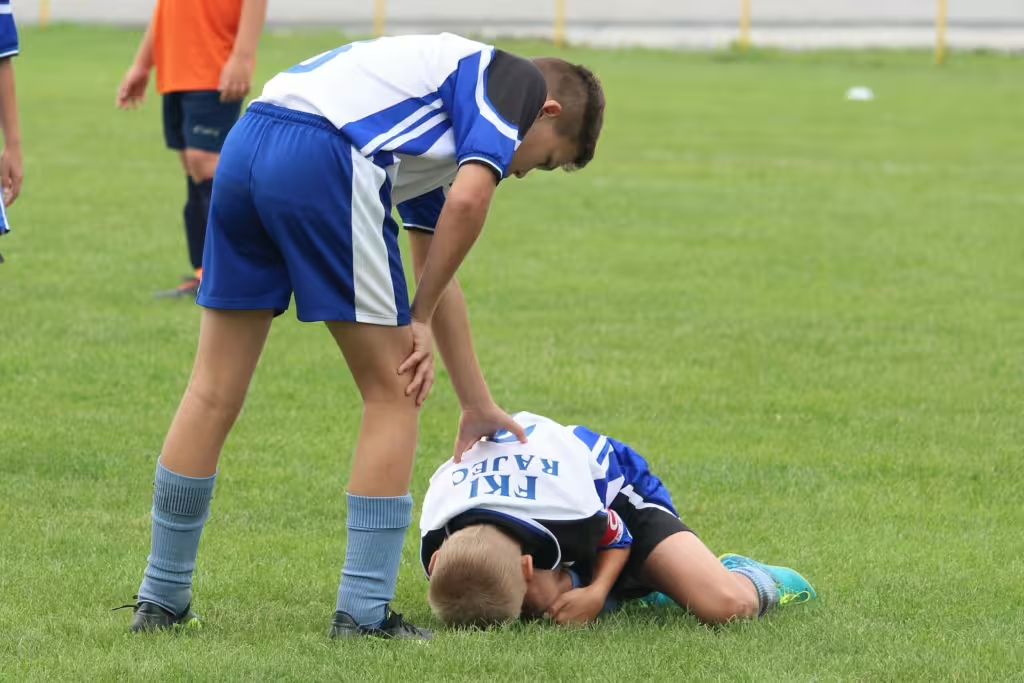
The Role of Encouragement in Team Success
Teamwork isn’t just about working towards the end goal of a win, it’s about encouraging one’s teammates to do the same. Thus, encouragement is a huge part of evincing effective team spirit. When children cheer each other on, it makes everyone feel more confident and ready to give their best effort. This works from the sidelines, the dugout, or on the field itself. For instance, imagine your child is about to take a big shot in basketball or attempt a difficult gymnastics move. Hearing their teammates say, “You’ve got this!” can make a big difference in their mind, especially if they haven’t really encountered that kind of support from anyone except their parents before.
In a similar fashion, encouragement helps calm nerves and gives young players a mental boost, both of which will make them more likely to succeed. At the same time, encouragement isn’t just for celebrating wins, it’s also about comforting teammates after they have made mistakes. When a teammate say things like, “It’s okay, you’ll get it next time!” or “Shake it off, we’re with you!” it helps every member of the team keep a positive attitude and stay focused on improving, rather than dwelling needlessly on the error.
How Team Spirit Builds Trust
Trust is the cornerstone of team-building and friendship-building. In fact, trust is a main facet of every relationship our kids end up involved in, from the very beginning. From birth, trust is how we connect with our children. They learn to trust us to keep them safe, to feed them, change them, guide them. This is why the trust they learn whilst interacting with their first sports teammates is so essential for everyone involved.
Strong team spirit is built on trust. Knowing that one’s teammates will have one’s back is important. It means that teammates can rely on one another. When trust is secured, young athletes can shift their focus to playing their best rather than worrying about letting others down. In team sports where players work closely together on strategy, say soccer, basketball, rugby, or football, trust is knowing that everyone has their part to play and will do it well.
Soccer, for example, has defenders, forwards, and midfielders. The defenders trust that midfielders will help move the ball forward, while the forwards trust that their defenders will protect the goal. This kind of trust helps sports teams work smoothly and efficiently.
Trust, however, is not a given; it’s earned. Building trust takes time and effort and involves showing up to practice, communicating openly, and supporting each other through both good and tough times. Once trust is built, though, the team will be stronger and more connected.
How Supporting Each Other Leads to Personal Growth
Being part of a supportive team doesn’t just help the team—it also helps each individual child grow. When children learn to support other people, they also learn important skills and qualities that will help them become better people, both on and off the field.
Selflessness: Team spirit teaches children to think beyond themselves, to support others and celebrate their achievements as well as their own. Selflessness helps young athletes learn the importance of putting the team’s success above individual accomplishments.
Empathy: Encouraging teammates during difficult times helps kids builds empathy; something that, while intrinsic in most children, isn’t always easy for them to express during stressful situations. Children learn to understand what others might be feeling, which helps them to become kinder and more compassionate people.
Resilience: When a young athlete is part of a supportive team, they learn to bounce back from challenges faster than those who aren’t really gelling with one another. Knowing that one’s teammates believe in them can help them to stay strong, even after a tough game or practice.
Accountability: Being part of a team helps children develop a tangible sense of personal responsibility. Kids begin to understand that their actions impact the team, so they become more committed to giving their best effort.
Communication: Teamwork helps build communication skills in children. Supporting others requires good communication, so by encouraging their teammates and sharing helpful feedback, kids learn how to communicate positively and constructively.
The Power of Team Spirit in Overcoming Challenges
It doesn’t matter whether its a junior varsity team, an olympic team, or a pro sports team; every team faces challenges along the way. It could be a particularly tough opponent, a long losing streak, or a big game or championship event. The point is, strong team spirit can make all the difference in how a team handles these challenges. Teammates that are there to support each other are more readily available to manage tough moments, losses, injuries, or setbacks.
Ultimately, these challenges don’t amount to. much in the long run. Facing challenges together strengthens the team as a whole, as teammates learn that they can rely on each other, and that, even if they lose, they’ve done their best and have each other’s backs. This kind of resilience is one of the biggest benefits of team spirit when it comes to children; who may not be so accustomed to setbacks of any kind.
Examples of Team Spirit in Action
There are a number of ways that children can learn to build team spirit. Below are some examples of team spirit as it pertains to different sports:
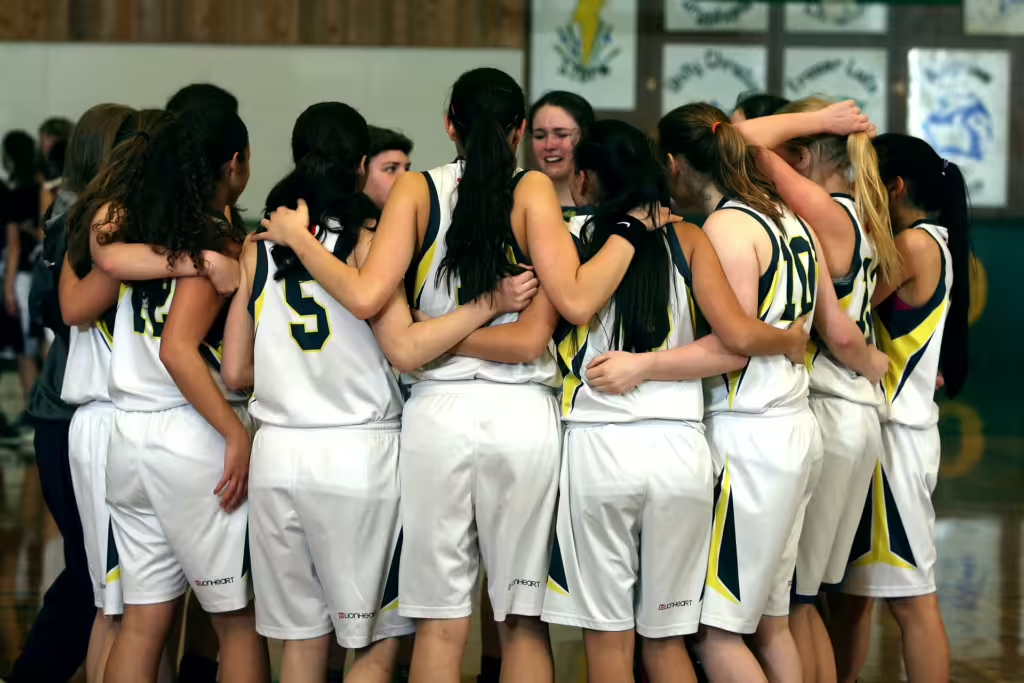
- Basketball: When a player makes a great pass or an impressive shot, basketball teammates usually celebrate together with high-fives or cheers. Even if someone misses a shot, teammates often clap and encourage them to try again. This support keeps everyone’s confidence high.
- Soccer: Team spirit in soccer is shown when teammates help each other up after a fall, or when defenders cheer on the goalkeeper for making a great save. After a goal, the entire team celebrates together, showing that each player’s role is important.
- Gymnastics: Gymnastics might be an individual sport, but gymnasts often train as a team in order to learn the basics and get better. Teammates cheer each other on during practice and at competitions, and they offer support if someone is nervous or makes a mistake. Team spirit in gymnastics shows that even in individual sports, support matters.
- Swimming: Swimmers cheer each other on before and after swim team races, especially during relay events. Even if one swimmer finishes last, their teammates usually celebrate their effort, knowing that every point counts.
Why Team Spirit Makes Sports More Fun
At the end of the day, team spirit is how children learn to make their sports experience fun and meaningful. When young athletes support each other, there’s less pressure for each of them to be perfect. This is particularly important when children put too much pressure on themselves to be so. The emphasis is then more on the whole team enjoying the journey together. Sports ceases to be a chore or an unattainable quest for glory, and instead becomes a place where kids connect, grow, and experience the excitement of achieving goals together.
For kids, being part of a team with strong team spirit creates memories that could end up lasting them a lifetime. Indeed, many of us parents have similar fond memories of our days on the pitch, court, rink, or baseball diamond. Sure, winning is always great, but the friendships, confidence, and the positive attitudes that children gain from supportive teammates are even more valuable to a growing mind and spirit. Teamwork and team spirit teaches young athletes that sports are about more than just competition—they’re about coming together and supporting each other.
Cultured Athlete Says..,
As you can see, team spirit isn’t just at the heart of any successful team, it’s the key to children growing and learning about life through athletic involvement. Kids who understand team dynamics learn to support their teammates, encourage their peers, and work together with their newfound friends toward shared goals, Team spirit mixed into the pot is a the vert recipe for success; it builds confidence, teaches valuable life skills, and makes the experience of playing sports a positive and exciting one that children are more likely to want to continue for years to come.
Discover more from CulturedAthlete
Subscribe to get the latest posts sent to your email.

